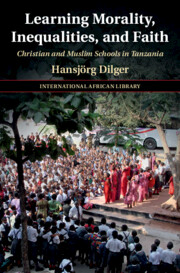Book contents
- Learning Morality, Inequalities, and Faith
- The International African Library
- Learning Morality, Inequalities, and Faith
- Copyright page
- Contents
- Figures
- Acknowledgements
- Note on Language Use
- 1 Introduction
- Part I (Post)Colonial Politics of Religious Difference and Education
- Part II Moral Becoming and Educational Inequalities in Dar es Salaam
- 4 Market Orientation and Belonging in Neo-Pentecostal Schools
- 5 Marginality and Religious Difference in Islamic Seminaries
- 6 Privilege and Prayer in Catholic Schools
- 7 Conclusion
- References
- Index
- Titles in the Series
6 - Privilege and Prayer in Catholic Schools
from Part II - Moral Becoming and Educational Inequalities in Dar es Salaam
Published online by Cambridge University Press: 16 December 2021
- Learning Morality, Inequalities, and Faith
- The International African Library
- Learning Morality, Inequalities, and Faith
- Copyright page
- Contents
- Figures
- Acknowledgements
- Note on Language Use
- 1 Introduction
- Part I (Post)Colonial Politics of Religious Difference and Education
- Part II Moral Becoming and Educational Inequalities in Dar es Salaam
- 4 Market Orientation and Belonging in Neo-Pentecostal Schools
- 5 Marginality and Religious Difference in Islamic Seminaries
- 6 Privilege and Prayer in Catholic Schools
- 7 Conclusion
- References
- Index
- Titles in the Series
Summary
The former Catholic and Protestant mission churches have been at the forefront of providing educational services during large parts of Tanganyika’s/Tanzania’s history. Chapter 6 examines a Catholic primary school – established by a German order of nuns in the early twentieth century, nationalised in 1969, and then returned to the Catholic church in the early 2000s – and its corresponding high school, which was opened in 2010. The owner of the schools, the Catholic archdiocese of Dar es Salaam, emphasises that it collaborates closely with the Tanzanian government to provide social services for the socially underprivileged. However, the two schools operate on the basis of comparatively high school fees and have the reputation of being ‘top schools’ that attract families and students from the middle and upper classes. The chapter argues that the Catholic schools are aware of the discrepancies between these diverging ethical orientations and work to forge affective commitment to their workplace among their teachers, who feel somewhat inferior to their pupils due to differences in social status and the parents’ condescending attitudes. Furthermore, it shows that pupils are trained to embody the values of the Catholic middle-class environment through particular forms of bodily discipline and regular attendance at church events. Finally, students engage in cultivating an ethos of helping and caring for ‘the needy’ in Dar es Salaam, for example by participating in a charitable trip to a local orphanage.
Keywords
- Type
- Chapter
- Information
- Learning Morality, Inequalities, and FaithChristian and Muslim Schools in Tanzania, pp. 177 - 217Publisher: Cambridge University PressPrint publication year: 2021



